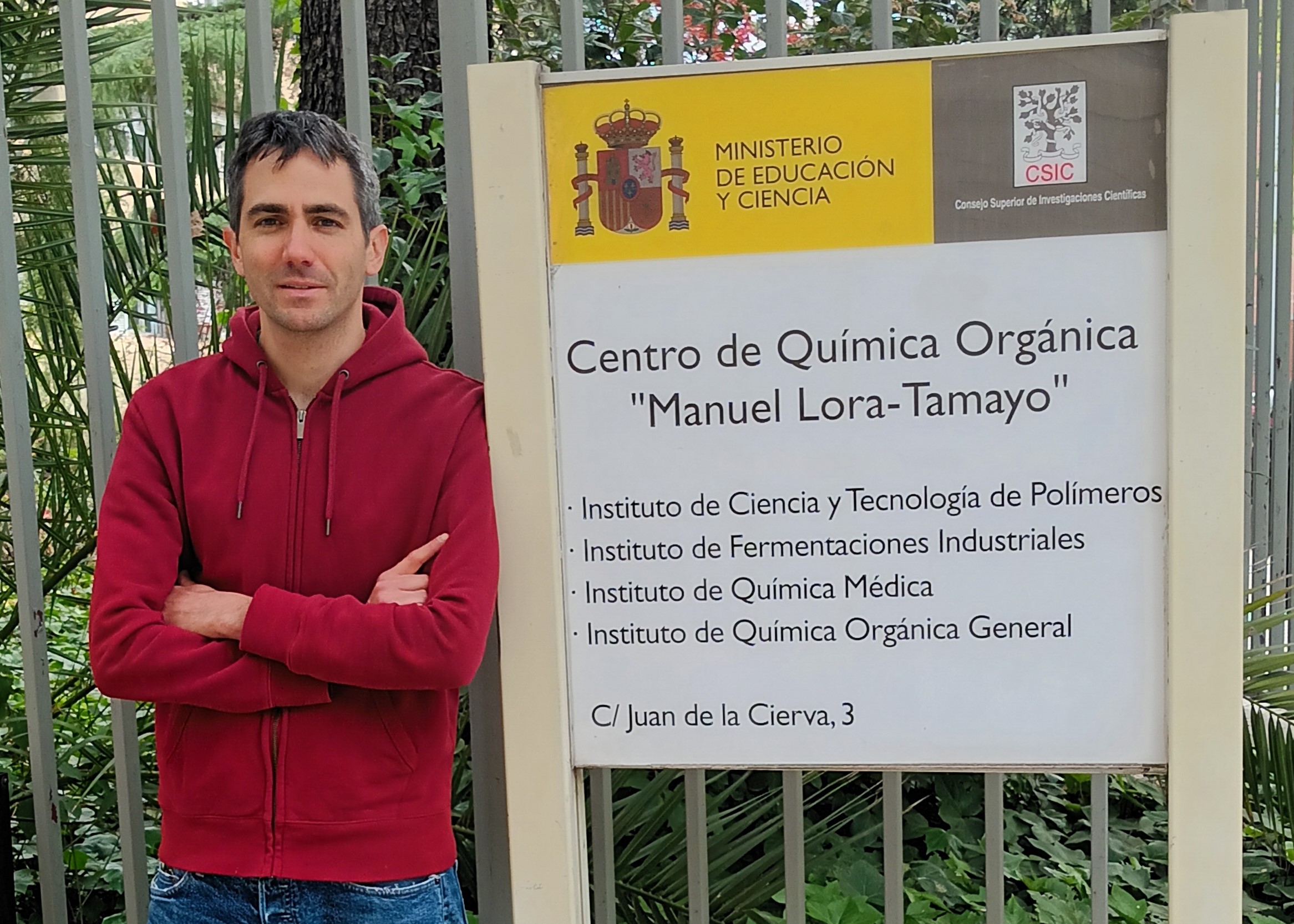
Diego Núñez Villanueva holds a degree in Chemistry from the University of Málaga (2007) and a PhD in Chemistry (2013) from the Complutense University of Madrid. He carried out his PhD at the Instituto de Química Médica (IQM, CSIC), working on stereoselective synthetic routes to access quaternary amino acids and their application as peptide secondary structure inducers.
As postdoctoral researcher at the universities of Sheffield (2013-2014) and Cambridge (2014-2022), he started a new research program studying chemical alternatives to nucleic acids for encoding and transferring sequence information. Before joining the ComFuturo program, he worked as senior scientist at Bicycle Therapeutics (2022-2023), biotech founded by the 2018 chemistry Nobel prize winner Greg Winter.
He has contributed significantly to the generation of knowledge and technology transfer (20 articles; 1 patent; h-index: 11) and played a key role in prestigious funding schemes, such as ERC Advanced Grants. Since April 2023 and until April 2024 he worked as a ComFuturo fellow developing his project TemplaPept at the IQM. In April 2024 he started a new position in the IQM with a Ramón y Cajal contract.


Extended project summary:
The molecular basis of many diseases is not fully understood yet. This is the case for diseases which have attracted a lot of attention, such as cancer or neurodegenerative diseases, but also for rare diseases with small patient populations, dampening commercial interest in the development of treatments or diagnostic devices. Innovative approaches are therefore still needed to break the limits in understanding, at the chemical level, key biological processes. Success in this direction will provide groundbreaking information for developing new therapeutic agents.
Misregulation of protein-protein and carbohydrate-protein interactions is often implicated in disease states, constituting promising therapeutic targets. The aim of the TEMPLAPEPT project is to develop a novel technology as a platform for the study of these interactions beyond current knowledge. In particular, this project proposes a novel methodology for the stabilization of helical peptides, key structural element involved in a significant population of protein-protein and carbohydrate-protein interactions. This technology is based on the use of the α-helix structure as template for choosing the optimal helicity inducers and will also serve to engineer interesting properties in these peptide conjugates, not accessible by current methods. This is a general technology applicable to virtually any relevant target in which protein-protein and carbohydrate-protein interactions are involved, offering a broad scope of potential biological applications. Moreover, immobilization of helical scaffolds onto surfaces will allow the study of multivalency in such binding events, essential to control their affinity and selectivity.
This is a multidisciplinary project, combining organic and medicinal chemistry with biophysical and structural techniques. It is strongly based on the researcher’s background in synthetic supramolecular chemistry and molecular recognition.
Scientific output derived from the ComFuturo TEMPLAPEPT Project
Scientific articles
P. Bolgar; M. Dhiman; D. Núñez-Villanueva; C. A. Hunter (2025). Covalent template-directed synthesis: a powerful tool for the construction of complex molecules. CHEMICAL REVIEWS. DOI: 10.1021/acs.chemrev.4c00505
D. Núñez-Villanueva (2024). Revisiting 310-helices: biological relevance, mimetics and applications. EXPLORATIONS IN DRUG SCIENCE. DOI: 10.37349/eds.2024.00034
D. Núñez-Villanueva; A. Plata-Ruiz; I. Romero-Muñiz; I. Martín-Pérez; L. Infantes; R. González-Muñiz; M. Martín-Martínez (2023). β-Turn induction by a diastereopure azepane-derived quaternary amino acid. JOURNAL OF ORGANIC CHEMISTRY. DOI: 10.1021/acs.joc.3c01689
Book chapters
P. Esteban-Arderíus; C. Cuadros-Higueras; D. Núñez-Villanueva (2024). Synthetic approaches to heterocyclic α,α-disubstituted amino acids. TARGETS IN HETEROCYCLIC SYSTEMS-CHEMISTRY AND PROPERTIES (ITALIAN CHEMICAL SOCIETY). DOI: http://dx.medra.org/10.17374/targets.2025.28.139. https://www.soc.chim.it/sites/default/files/ths/28/chapter_8.pdf
Works presented at congresses
L. Calahorra, J. Medina, C. Ayala, M. J. Pérez de Vega, R. González-Muñiz, D. Núñez-Villanueva. Novel spiroheterocycles obtained via the Groebke-Blackburn-Bienaymé reaction: versatile synthons in peptidomimetic chemistry. XIX Iberian Peptide Meeting (EPI 2025). Poster. Santiago de Compostela, Spain. 26/02/2025-28/02/2025
D. Núñez-Villanueva; L. Infantes; R. González-Muñiz; M Martín-Martínez. A diastereopure azepane quaternary amino acid as effective inducer of β-turns and 310-helices. XVIII Iberian Peptide Meeting. Oral presentation. Lisbon, Portugal. 20/11/2023-22/11/2023
Scientific seminars
D. Núñez-Villanueva. Encoding and replication of sequence information in synthetic oligomers. IQM-CSIC seminars 2023. Invited oral presentation. Madrid, Spain. 14/12/2023